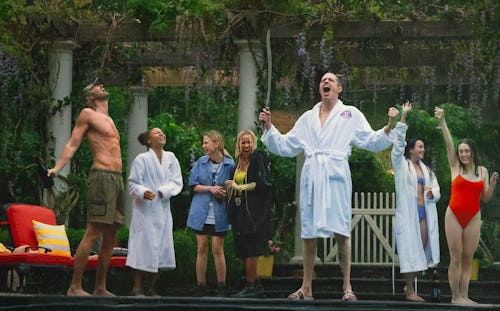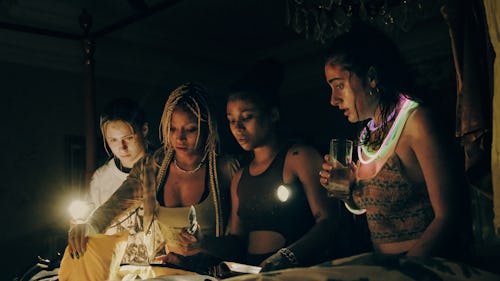
Here’s a new twist on a classic genre: in the realm of the slasher horror, have we ever felt like everyone in the house, under the spectral threat of a killer in the shadows, truly deserved to get murdered, simply because they were all so deliciously insufferable? That is largely the conceit of Bodies, Bodies, Bodies, the new horror comedy from Dutch filmmaker Halina Rejin that lives up to the hype of its buzzy South By Southwest premiere earlier this year.
The film, Rejin’s sophomore feature, is naturally billed as a kind of teen or young adult slasher: a group of wealthy friends hide away in a mansion, before someone mysteriously begins to pick them off. But it is much less a thriller than it is mostly a bitingly funny satire of the equally nihilistic and self-absorbed ethos that our proverbial digital hellscape has left us with. An edited montage in the film’s trailer neatly sums up this portrait of social skewering here, as various characters indignantly parrot the language of an often wounded, self-pathologizing generation: you’re always gaslighting me; you fucking trigger me; you are so toxic; you’re silencing me!
“The fact that they’re particularly wealthy, particularly vain, particularly cutting, and worst of all without phone reception only exacerbates things.”
You might think of it as the cinematic version of “gaslight, gatekeep, girlboss,” though in the film, the way lines like these land are far funnier and less awkwardly forced than one might expect. After all, there is something that feels inherently cringey about the idea of a movie, or any mainstream entertainment, being billed as some sort of “Gen-Z-age” parody, largely because few major works of art have yet to convincingly capture the specific language and worldview of being a young person today. Most works that attempt to do so instead inadvertently expose the age of those behind the camera (one can say that includes even Euphoria, a show that, if it were not elevated by its cornucopia of stylized eye candy, would leave us with a teen soap opera that reads at least partly as a boomer’s absurdist fears of what “kids these days” are doing).
Yet, the rare success of this tricky brand of satire is what gives Bodies the trappings of what feels like an instant generational classic. The film opens with Sophie (Amandla Stenberg) bringing her new girlfriend, Bee (Maria Bakalova), to her best friend David’s (Pete Davidson) family getaway where her larger group of privileged 20s-something pals (plus Lee Pace as one of their 40-year old Tinder dates) plan to party away an incoming hurricane. Giddily, they decide to play the titular game of catching a make-believe murderer. Real deaths ensue and a slasher is on the loose, but the horror at the heart of the film is less about bloodlust, and more about each other: the hidden tea, the buried grudges.
The fact that they’re particularly wealthy, particularly vain, particularly cutting, and worst of all without phone reception only exacerbates things. “They’re not as nihilistic as they seem on the internet,” Sophie tells Bee as a kind of warning before they reach the house. Or maybe they are. Bodies deftly embodies the caustic spirit of the modern age: Everything is about you, everything is fucked, and everything is a joke, from your anxieties and your vanities, to the idea of being murdered itself — what else can you do but operate this way when you’re young, every sense of your being has been commodified by the algorithm, and the apocalypse is in full-swing?
Rejin’s direction and the script from Sarah DeLappe both nimbly toggle the perfect tone for the film: riotously fun and, most importantly, mocking in a way that never veers into finger-wagging. It all makes perfect sense when you recognize that the script originally sprouted from a story that Kirsten Roupenian of polarizing “Cat Person” fame wrote, and that DeLappe, whose Pulitzer-finalist play “The Wolves” offered a moving high school drama (partly sprouting from her experience spending time with teenagers when she was moonlighting as a tutor) that nailed the nuances and cadences of teenage girlhood, was the one to adapt it.

The eclectic ensemble cast, though, is what truly makes the film sing. It is a breakout comedic performance for Rachel Sennot (Shiva Baby), who is easily the funniest of the cast; wisely, Pete Davidson is not overused, a key calibration here considering how much of a meta Pete Davidson-esque character he is playing, one that can easily threaten to grate, but is instead scene-stealing in its places here; Lee Pace as a human-sculpture-himbo is one of the more unpredictable and ultimately fun casting choices in an ensemble in recent memory.
Stenberg is a stealthily pitch-perfect choice to lead the cast — someone whose celebrity has been often seen through the lens (through her own self-doing, she would likely admit) of activism that can now, in a more politically cynical (or clear-eyed) year of 2022, read as naively self-serious if also admirable. She makes complete sense for a film that is most satisfying for how it gleefully skewers the absurd, well-meaning, contradictory, and often navel-gazing political ethos of the online era.
That focus is truest and funniest in a climactic scene where the group truly trades all of the shots that each have been saving up. In one of the most memorable lines of the film, Alice (Sennot), after fumbling through explaining her white allyship bonafides, exposes Jordan (Myha’la Herrold), the supposed hard-nosed striver of the group, in a death-blow line: “Your parents are upper. middle. class.” It is a hilarious dig and captures the energy of a certain pervasive brand of internet brain, one in which the social embarrassment derives not from not being rich enough, but rather, not having suffered enough.
Bodies, Bodies, Bodies deserves its praise as a decent entry on the reliably rewatchable shelf of slasher films. But its staying power will likely derive from the film’s playful exposing of a generation that has never been more obsessed and horrified with itself. The game of murder-turned-real is bloody fun, but what’s scarier than the real thoughts that keep you up at night, wondering what your friends really think about your little podcast?







